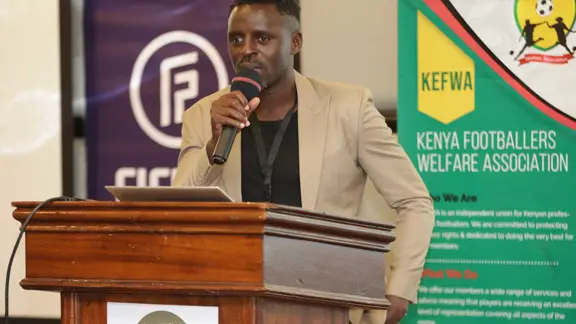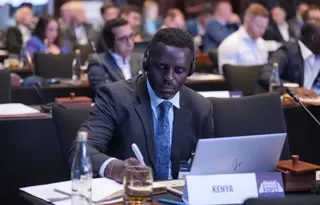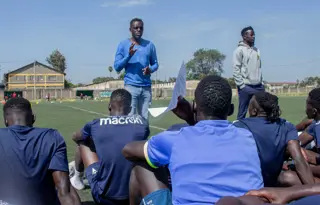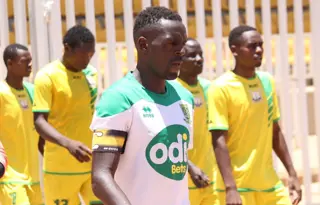News
People of the Union: James Situma (Kenya)

People of the Union puts the spotlight on individuals across FIFPRO’s member associations who are dedicated to improving the wellbeing of professional footballers.
James Situma is the president of the Kenya Footballers Welfare Association. The former defender talks about his football career and his passion for the union.
FIFPRO: Tell us about yourself: what is your current role and what is your background?
James Situma: I started my professional career during my last two years in high school. I started at Nzoia Sugar and after that, I moved to the city, Nairobi, the capital of Kenya, and I played for teams such as Nairobi Stars, Sofapaka, AFC Leopards and Tusker FC. I was a captain at all those clubs and the national team as well. I took my profession very seriously. Where I was born, football could change your life. My passion for the game came first, but I also realised that I could earn something from football. I wanted to use football as a tool to change my life first and then my family’s. I always gave it my best in training and during official matches. Our principal in high school always told us that you should give it your best in everything you do. It helped, as I am proud to say that football brought something good to my life.
The first time I heard about the Kenya Footballers Welfare Association (KEFWA) was in 2012. I was interested in becoming part of this organisation that looked after the welfare of players, so I joined as a member. When I was at Tusker, a union delegation led by then-president Innocent Mutiso visited us. He wanted me as his vice-president. I liked the idea, as it would give me a good opportunity to push for the welfare of players. At my previous team, I had noticed financial issues, problems with contracts and players who were being misled by agents. Mutiso was elected and I joined him. When he left in 2017, I became the president.

What issue affecting players welfare are you most passionate about?
Contractual issues. We want to have a standard contract and a collective bargaining agreement (CBA) in place. In Kenya, every club has its own contract. There are clubs taking advantage of players being desperate to sign with a team. They don’t give them enough time to study the contract to make sure they sign something they understand. As a result, some players have clauses in their contract that don’t benefit them. There is new leadership at the Football Kenya Federation since November last year, including a new vice-president, former Inter player McDonald Mariga, with whom I've played in the national team. I hope we can advance with them and arrange a deal.
Can you share one of your proudest moments or achievements working as a union representative?
I have a couple of them, but the main one is the collaborative agreement we signed with Zetech University. A couple of years ago, we did a player survey and it made us realise that the majority wanted to go back to school. The players need to have a safe transition from their active football career to another career. We have arranged a substantial discount of their school fees with Zetech. More than 50 students have graduated or are still studying.

If you could change something in football, what would it be?
Something that I really want to stop is racism in football. I believe football brings people together, black and white, and all others. We should be one family.
What's your favourite football memory?
I have a couple because I played at the top level for almost 17 years, but my best memory is winning the Cecafa tournament with the Kenyan national team in 2013. Our country was hosting the event. On the day of the final, Kenya celebrated the 50th anniversary of the country’s independence. I remember the pressure on us, with the president telling us that we had to win it for the country. We were playing Sudan in the final. It was a tough game, but we won 2-0. I assisted with the second goal. I was playing right back, I overlapped, sent in a cross and my good friend Allan Wanga scored. The atmosphere was so great. The president had promised to take us to the World Cup in Brazil to watch games, if we would win, and he kept his promise.
Who is your favourite football player?
I'll go with Lucio, the defender from Brazil. I have always looked up to him because he is very humble, hardworking, is a leader and believes in the virtues of praising God.

FIFPRO is celebrating its 60th anniversary this year. What does being part of a global union mean to you?
It means a lot. Being one of the 11 members from Division Africa makes us proud. We are a small football country, while there are bigger football nations on our continent that have not managed to become affiliated yet. The support of FIFPRO has enabled us to push the agenda of player welfare in Kenya.
Whenever we have challenges on how to guide players, we know we have a body that we can get in touch with to ask for guidance and advice, any time. We fight for the players because we know we have a big brother who always has our back to make sure we push these agendas. It has made us much stronger.
As #FIFPRO enters its 60th year, we’re proud to share the voices of the members who’ve shaped our journey ❤️
— FIFPRO (@FIFPRO) December 15, 2024
#FIFPRO60 pic.twitter.com/EvXAhlTXO6
Could you give one example of the value of FIFPRO for your organisation?
During the Covid-19 period, players were experiencing big problems. They couldn't even afford to pay the rent, medical bills or food. With the support we had, we managed them through the period, that they could stay on top until things got better. FIFPRO helped us with questionnaires, for example about payment: which clubs were paying their players, which players had contracts, and which players didn't. As an organisation, it gave us a lot of data that we could use to support the players.
What do you hope to see unions unite more on to shape the future of football for players?
One of the challenges that we have in Kenya is the difference of arbitration for local and foreign players. A local player has to wait much longer to get a decision from a local arbitration committee in comparison with a foreign player who can, for example, go to the FIFA Dispute Resolution Chamber. It puts us in a very awkward position, as the local player will ask us why he has to wait for such a long period, while the foreign player with a similar issue got a quicker solution. I want all unions, especially those in Division Africa, to come together to change this.
